#Non-fiction review
Text
Review: Letters to a Writer of Color Anthology
Authors: Madeleine Thien, Tiphanie Yanique, Xiaolu GuoEditors: Deepa Anappara, Taymour SoomroPublisher: Random House TradeReleased: March 7, 2023Received: NetGalley
Goodreads | More Non-Fiction Reviews
Book Summary:
Letters to a Writer of Color is a collection of essays exploring literature, and its impact on sharing experiences. As such, it delves into the lives and stories of real people,…

View On WordPress
#Book#Book Review#Books#Deepa Anappara#Fiction#Letters to a Writer of Color#Letters to a Writer of Color Anthology#Literary#Literature#Madeleine Thien#Net Galley#NetGalley#non fiction revoew#Non-Fiction#Non-fiction review#NonFiction#NonFiction Review#Random House#Random House Trade#Review#Taymour Soomro#writers#writing#Xiaolu Guo
2 notes
·
View notes
Text
non-fiction review | the trauma beat by tamara cherry
The Trauma Beat: A Case for Re-Thinking the Business of Bad News by Tamara Cherry
In The Trauma Beat, Cherry shows how desperately we need to restructure the way we (journalists and people at home) treat traumatic death and events in the media – all the while providing the exact sources and resources that will help in making change stick. She interviews current and prior members of the press,…

View On WordPress
5 notes
·
View notes
Text
youtube
100th review!!!!!
#the heir's lair#review#book review#non-fiction#historical#warfare#military#the art of war#non-fiction review#historical review#Youtube
0 notes
Text
🚩🚩🚩🚩🚩A red flag in any book I read that makes me instantly put it down is when an author goes into detail describing the chest or sexualising the body shape of an underage female character. I hate it whether it goes into a heavy detail or does it offhandedly, I just have to stop reading it. Especially if the point of view is from a grown man who is supposed to be the protagonist I support while reading. 🚩🚩🚩🚩🚩🚩
#books#readers#book red flags#books & libraries#books and reading#book review#reading#authors#writers#female characters#writing#gross and unnecessary#fiction#non fiction#red flags#male authors#female authors#It's gross you're gross
104 notes
·
View notes
Text
101 Essays that will change the way you think, a personal development book by Brianna Wiest is a compilation of short essays that discuss why you should pursue purpose over passion, embrace negative thinking, see the wisdom in daily routine & become aware of the cognitive biases that are creating the way you see your life.

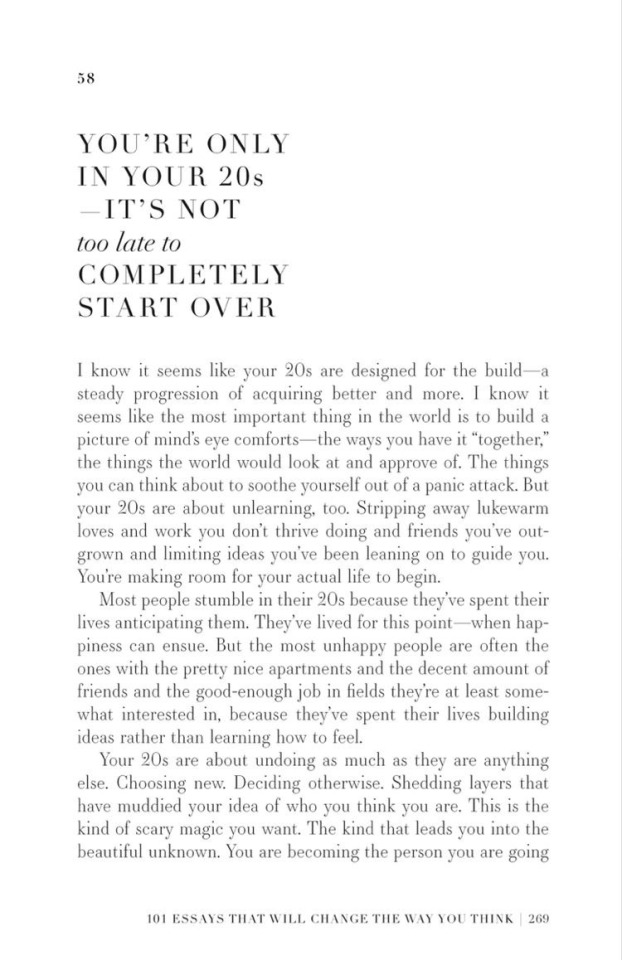


#brianna wiest#personal improvement#personal development#booksofig#best seller books#new books#bookstagram#books and reading#bookshelf#book review#bookaddict#bookpromotion#bookish#booknerd#nonfiction#non fiction#booktiktok#booktok#101 essays that will change the way you think
860 notes
·
View notes
Text
I remember as a child hearing phrases like "Only the strong survive" and "survival of the fittest" and feeling terrified, because I knew I was neither strong nor fit. I didn't yet understand that when humanity protects the frail among us, and works to ensure their survival, the human project as a whole gets stronger.
John Green, The Anthropocene Reviewed (Staphylococcus Aureus)
#The Anthropocene Reviewed#John Green#Essays on a Human-Centered Planet#cripple punk#disabilty#disability activism#chronic illness#non fiction#nonfiction#the Anthropocene#nonfiction quotes#page 80#staphylococcus aureus
28 notes
·
View notes
Text
[N5] バナナは日本一
Last reblog reminded me of the free graded reader バナナは日本一 which includes cute illustrations and is suitable for readers with a good grasp of JLPT N5 grammar and vocabulary.
It can be downloaded via Yomimono Ippai as a free pdf.
#my book reviews#reading in japanese#easy japanese#free japanese reading resources#free graded readers#japanese graded reader#JLPT N5#N5#Non-Fiction#yomimono ippai#study japanese#日本語#learning japanese#やさしい日本語
22 notes
·
View notes
Text

I've found my first review-worthy book of the year!
Eve by Cat Bohannon is a female-focused history of human evolution and a synthesis of pretty much every research field as it pertains to women. It's also readable and witty and one of those rare science books where I actively had to stop myself reading because I had to, say, go to bed.
Simply taking all the scientific research and turning it into layperson language would get this book praise. (You should see how many studies get cited.) Taking that research, relating it readably, and then drawing overarching conclusions? For instance, studies on how and when cis-female bodies produce sex hormones, and studies on how sex hormones affect neurology, and then saying something like, "this is why pregnant people are moodier"? That takes the whole thing to another level.
And it covers so much! It starts with the first mammals, moves through early primates and hominins, draws in studies of mice and apes and history and economics, talks about language and aging, and ends with the evolution of social relationships and thoughts on the future. There's a lot that I found enlightening, engaging, and validating, and a lot of moments where she reframed something and changed my thinking. And she's very comfortable calling out cultures and researchers and ways of thinking (and ducks and chimpanzees) for how they treat their species.
But like all books, it isn't perfect, though with such a subject, it probably couldn't be. For instance, because Bohannon is focusing so much on the average (i.e., cis-perisex) female body, trans and intersex folks don't come up much, though she's very clear that trans women are women, trans men are men, and intersex conditions are not problems. (Also, I'm sure the lack of info correlates strongly to a lack of studies, but she only mentions this a time or two.) *
More importantly, though, given that this is science writing and one expects scientists and writers to back up their claims, she doesn't always. Most of the time when she doesn't, it's clearly speculation or synthesis or some form of "if X, then Y" but sometimes it's less clear. I keep going back here to her statement that the first hominin culture with midwifery had exclusively female midwives. I would absolutely buy this, especially based on some of her points later in the chapter, but she never says why there couldn't have been the odd male. After all, later in the book she also mentions how men-who-help-women could have shifted the dynamics of the band/tribe/group closer to what we see today and that this probably started around the same time. To be fair, jumps like this are fairly rare but they do make me question if there were others I missed or more statements I should have questioned.
So basically, I'm saying this is an important book, and a good book, and a book that should be read by a lot of people, but also a book to read a little critically. Bohannon makes a lot of really great points and relates a lot of intriguing facts and tells some compelling stories about who we are and how we got here. She's done good work with this book and should be proud of it. But also, there might be some spots where her arguments could be tighter.
*she also prioritizes words like "she" and "mother" and "woman" over words like "parent" and "person", which I can see not being great for some trans people even though I understand that she's trying to upend the notion that the average human is a cis male and show that female/afab bodies are pretty important.
#booklr#bookblr#adult booklr#science writing#book reviews#human evolution#hominins#cat bohannon#eve#my photos#read in 2024#non-fiction#book recommendations
27 notes
·
View notes
Text
Review: Jeff Corwin: A Wild Life: The Authorized Biography
Author: Jeff CorwinPublisher: Puffin BooksReleased: September 3, 2009Received: Own
Goodreads | Biographies | Non-Fiction
Book Summary:
Jeff Corwin is one of several animal advocates that a generation grew up watching. He never hesitated to throw himself into the wild, teaching children (and adults) about everything and anything he could find. He still does this, in fact.
He was a host of…

View On WordPress
#autobiography#Biography#Biography Review#Book#Book Review#Books#Fiction#Jeff Corwin#Jeff Corwin: A Wild Life#Jeff Corwin: A Wild Life: The Authorized Biography#Literary#Literature#non fiction revoew#Non-Fiction#Non-fiction review#NonFiction#NonFiction Review#Puffin Books#Review
0 notes
Text

The Hobbits Of Tolkien by David Day
This is another book I randomly found at the book fair. I had no idea David Day had a collection of books regarding the world of Tolkien, but i am now considering getting the rest of the series, because i loved this so much. I didn't know much about this book when I got it, I saw it was about hobbits and that was enough to pull me in (to no one's surprise). This book is very language focused. It's a non-fiction, mostly dedicated to the hobbits and the shire, and it analizes how the names that Tolkien chose weren't as random as they could seem. Tolkien put a lot of thought in the names he picked, and they play a huge role in shaping the world and characters he created. Most importantly there's a huge quantity of puns that just made everything better. Clearly a normal person reading his books can't figure out all of these puns, and I love to think that he just put them everywhere for his personal fun. What I should highlight is that this linguistic and philological theme of the book is made very accessible. The book felt very light to read, and it was a super quick read too. Things are explained easily and the content feels fun and not overwhelming at all. I would very much recommend picking this up if you're a fan of Tolkien's world and want to know more, and if you are someone who is deep into language this is a great book for you. Don't be intimidated if on the other hand you aren't that familiar with these topics, I definitely don't have any philology related knowlege, and this still felt super comprehensible and somewhat cozy.
#2023 book#book#books#bookblr#booklr#bookish#book rec#book recommendation#book review#david day#tolkien#hobbit#hobbitcore#the hobbits of tolkien#non fiction#lotr#studyblr#reading#mine#the---hermit
96 notes
·
View notes
Text
The Wicker Man (1973, dir. Robin Hardy)’s Spit in the Face of Cops and Colonialism
Exploring The Wicker Man’s themes of authority and control on its 50th anniversary.
On Medium / / On Patreon.

Still from The Wicker Man (1973, dir. Robin Hardy), via FILMGRAB.
The Wicker Man (1973, dir. Robin Hardy) is a stalwart classic of the horror genre, and particularly the folk horror subgenre. It was re-released in 4K for its 50th anniversary on the Summer Solstice last month, and after all these years it’s as impactful as it ever was.
The Wicker Man opens with the arrival of Sergeant Neil Howie, a police officer from the mainland of Scotland, on Summerisle, a strange island in the Hebrides. After receiving an anonymous letter reporting that a young girl, Rowan Morrison, has disappeared without a trace, he begins to interview the denizens of the island in search of her.
As the film progresses, Howie, a staunch Christian, must contend with the strange mores of the island, a culture with which he’s unfamiliar — men and women freely have sex with one another; monogamy, let alone monogamous marriage, is a distant thought; frequently, women frolic nude, and people sing loud, bawdy songs. People do not respect his authority as a police officer, find it laughable when he asks after the minister on the island, and the church hasn’t been used for Christian worship in decades. The people of the island have returned to a form of Celtic paganism, mentioning gods such as Nuada, as well as Greek gods like Aphrodite and Poseidon, and Christianity, for them, is a distant memory.
Initially in asking after the disappearance of Rowan Morrison, people deny even having heard of her, although the island is small and everyone knows one another.
When he finds a physical record of her at the schoolhouse, the story changes — Rowan Morrison was here on the island, but she’s dead. When he exhumes her body, the story changes again after he finds that there’s no girl in the casket, only a dead hare.
Howie’s dynamic with Lord Summerisle (Christopher Lee), who is the landholder and de facto ruler of the island, is contentious on Howie’s part — Howie bristles at being forced to submit to the authority of a private citizen, at the fact that his authority is deemed higher than Howie’s own; Summerisle, in contrast, is amused by Howie’s indignation. If anything, he’s playful with him.
Howie is frustrated on arrival with the attitude of the people on the island — no one seems to respect his natural authority as a police officer, often laughing or scoffing at his questions, and as time goes on he becomes angrier with the lack of adherence to what he thinks is appropriate Christian fare.
When he goes to the schoolhouse to ask after Rowan’s disappearance, he’s nearly frothing at the mouth with rage when the schoolteacher explains the phallic symbolism in the May Pole to her students, a group of 12-year-old girls. Afterwards, he demands a copy of the school register, and when the teacher asks if he has a warrant or permission to conduct a search, he shoves her out of the way to take the register from her.
This is a pattern that Howie repeats multiple times — later on, he angrily tells a woman in the records office that he doesn’t need a warrant, that he’s there as a police officer and can take what he needs; when he’s conducting further searches later on after finding Rowan’s coffin empty, he repeatedly forces entry into people’s homes, multiple times forcing locks and doors to barge in.
After Lord Summerisle teasingly advises Howie that detective work is down to him, Howie researches in the library, and discovers that the most recent harvest on the island was entirely insufficient — in his time on the island he’s been eating tinned food, and they don’t even have fresh apples to hand. He comes to the realisation that Rowan Morrison, who he’s certain is alive somewhere on the island, is due to be sacrificed in exchange for a more bountiful harvest next year.
Howie infiltrates the island’s May Day celebrations in disguise, and when Rowan is revealed, he runs to save her and flee with her in tow — only for her to turn around and ask the other adults of Summerisle if she’s done well.
Rowan Morrison was never going to be sacrificed at all: this whole campaign served only to lure Howie to the island, so that he, an adult virgin, a fool with no knowledge of the island, could be sacrificed instead. They even refer to his position as a cop, and how it gives him the power of a king.

The Wicker Man’s Neil Howie is by no means a hero.
He’s cold, bad-tempered, judgemental, and controlling. The two primary aspects of his character — his staunch adherence to his Christian belief on one hand, and his position and authority as a policeman on the other — are intertwined, and the film extends him very little compassion.
As a Christian, he is affronted by what he considers to be the spectacle of immorality on the island. Repeatedly, he demands of the Summerisle residents why they don’t adhere to what he thinks should be the default and usual beliefs.
He’s very angry indeed at the idea of the children of the island being indoctrinated with this pagan religion — that to be introduced to Christianity would be a similar form of indoctrination never occurs to him, and he’s offended at Lord Summerisle’s implication that the faith of the island is equal or even similar to that of Christianity in terms of legitimacy.
Howie is discomforted by and uncertain of sex and sexuality — nudity unsettles and deters him, and he bites out that he doesn’t believe in sex before marriage when the pub landlord’s daughter makes overtures in his direction, especially given that he’s seen many other young men on the island take to her bed.
Howie’s Christianity in itself is down to his personal belief — he is disapproving and condemnatory of the pagan faith and non-Christian practices on the island, but he is a visitor there, and an outsider.
Except for the fact that he is a policeman, and with the authority allotted him by the British state, he feels more than entitled to throw his weight around.
The fact that everyone on the island is comfortable and consenting with the cultural practices they all share is irrelevant to him: the sex they have and the open, frank discussions around sex and sexuality amount to public indecency and degeneracy in his eyes.
As an agent of the state, Howie wants to install what he considers to be public order, and it’s obvious that his perspective on this is influenced by his Christian beliefs, even though these technically aren’t upheld by the bounds of the law — but he oversteps the bounds by which police officers are meant to be contained.

At one point, he even breaks down a door and barges into a home, finding a naked woman in the bath — she blinks up at him, amused rather than frightened at his invasion, and he sputters and hurriedly retreats, more embarrassed by her nudity in her own home than his misconduct at breaking into it.
Everything about culture on the island is at odds with his need to be obeyed and submitted to as a police officer — he is furious even at the anonymity of the island when the people wear masks as part of their May Day celebrations, and he cannot keep track of their identities or know precisely who they are, which as a police officer he expects and demands.
A lot of horror criticises Christian belief, but much of the time these criticisms amount to making fun of absurd or silly beliefs that the film makers might consider Christians to have; occasionally, further criticisms are made of the power of the Christian institution, at Christian corruption or conspiracy within different branches of Christian churches, especially in regards to sexual abuse or other abuses of power.
The Wicker Man shows the flaws of one individual Christian, and not while taking the easy bait of mocking any silly beliefs of his.
Instead, the crux of Neil Howie’s personal flaws lie not in his Christianity itself, or even in his policing itself, but in the fact that as a Christian, he feels threatened and insecure when positioned in a place where his culture and religion are not treated as the default, and where his authority is not immediately submitted to with his Christian faith in mind.
The Wicker Man occurs in 1973, but replicates a familiar power dynamic — one of the white, British Christian who discovers a culture unlike and outside his own, and immediately wants all of it to change to match his sensibilities, to submit to what he considers to be the one, true religion.
Howie’s Christian faith in The Wicker Man cannot be separated from his desire to uphold the British imperial identity and the reaches of white British Christianity — he is given power to uphold this by his position as police officer, and this cannot be separated from that desire either.
It’s noteworthy that at no point does Howie discuss the whys and reasons certain things on the island are or should be immoral in his view until he is about to be sacrificed himself. He continuously brings up the church and the teachings of Christ, but in a tone of expectation — he is neither teaching nor preaching. He is merely showing his affront that the people of Summerisle don’t already know about them.
It’s only when Howie is about to be sacrificed that he brings up his own beliefs — when song after song has been sung by the people of Summerisle throughout the film, it’s only on the cusp of his death that he attempts to sing a Christian hymn of his own, drowned out not only by the other voices raised in song, but by the blaze he’s embroiled in.
Yes, Howie calls on his God and his Christ for help when he is dying, and yes, he attempts to take some solace in his belief at the end, but up until then, he doesn’t even uphold the tenets of his own faith. He shows no care for charity, for understanding, for patience, or any other Christian virtues.
He only draws on Christianity to add to what he feels is his natural authority, and uses it as a tool to extend his authority, and a shield to hide behind when faced with his own ignorance and discomfort. However unsuccessfully, he draws on Christianity as a tool in the way the British State has always done, using it as a means of suppression and cultural control.
The people of Summerisle win out — perhaps their sacrifice will help them, and perhaps Howie is right and the island cannot sustain further harvests, too overburdened already with its own population and their needs.
The thing about The Wicker Man is… It’s not necessarily that you root for the cultists. I know that some people have said that they felt this way when watching Midsommar (2019, dir. Ari Aster), that they too felt seduced by the comforts of the cult and its many promises.
The people of Summerisle, of course, aren’t trying to recruit Neil Howie — repeatedly, they tell him he should go. Politely, they invite him to take part in one dance or other, or in acts of sexual congress, but they are not trying to induct him into their faith, merely showing hospitality.

Just as it’s natural to root against the invading British imperial figure when he lands on any other island of natives and attempts to assert unwarranted control, you root against Howie.
He’s terrified by the people of Summerisle, but for all it ends in his sacrifice, Howie represents the face of true, indefatigable evil — that of British imperialism.
39 notes
·
View notes
Text
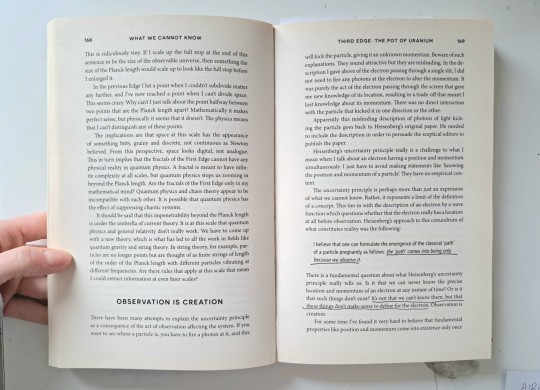
The books I'm reading at the moment.
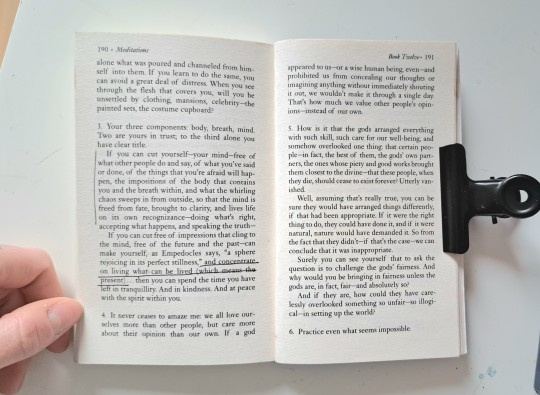
Meditations by Marcus Aurelius - I love this book. It puts you in the perspective of the time and space you occupy, I found a lot of my own thinking and feelings within the pages of this book. A guy born in AD 121 has very clear view on life that is still relevant today.
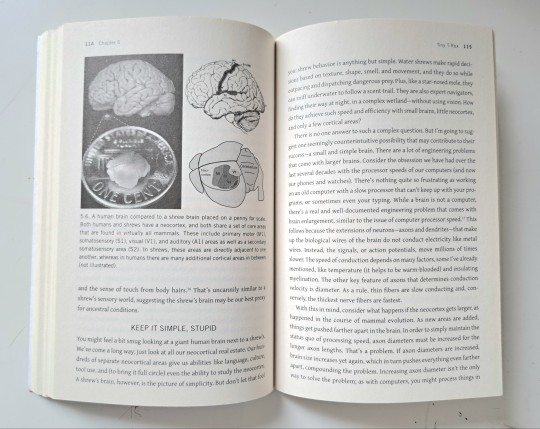
Great Adaptations by Kenneth Catania - A professor of biological sciences takes you on a journey with him while he studies various animals adaptive abilities. Star nosed moles, electric eels, tentacled snakes... Very interesting insight in how these creatures evolved and adapted.
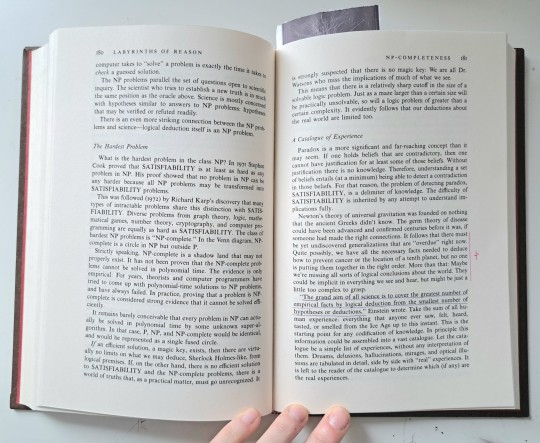
What we cannot know by Marcus du Sautoy - Explains concepts from the ground up, I like the illustrations that accompany the text and practical examples. Lays foundations to the known and wonders into the future of research and the possibilities that come with it as well as limitations. Covering themes from quantum physics and cosmology to sensory perception and neuroscience.
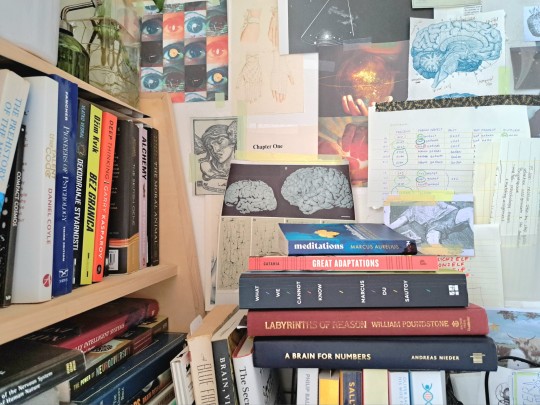
Labyrinths of reason by William Poundstone - "Blue sky, sunshine, deja vu glazed with dread." How do you know this isn't all a dream? Is anything certain? Ontology, logic, mathematics, deduction, epistemology, memory formation, paradoxes and puzzles.
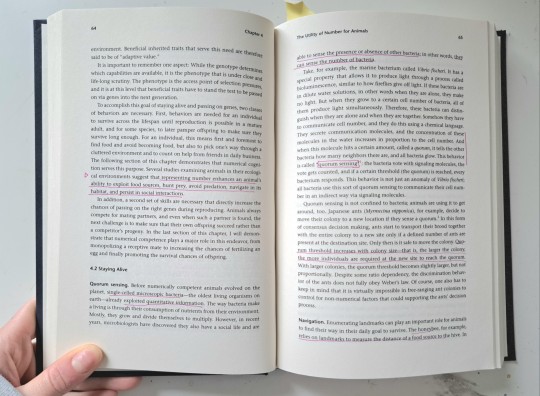
A brain for numbers by Andreas Nieder - Humans' understanding of numbers is intuitive. How are infants able to perceive numbers even before they learn the words for them? How do our brains process numbers? Can animals count? He shows how it is an adaptive ability and that plenty of animals have the number sense too. There is a variety of research and supporting evidence mentioned which I really like.
#currently reading#i should be studying#i have more books I have started byt they are on the long pause for now#I'm getting close to finishing this batch of books tho#book reviews#id reccomend all of these#bookblr#books and reading#non fiction#mine
112 notes
·
View notes
Text
TBR Pile Review: Who's Afraid of Gender, by Judith Butler
Format: 320 pages, HardcoverPublished: March 19, 2024 by Allen LaneISBN: 9780241595824 (ISBN10: 0241595827)
Description
Judith Butler, the ground-breaking philosopher whose influential work has redefined how we think about gender and sexuality, confronts the attacks on gender that have become central to right-wing movements today. Global networks have formed “anti-gender ideology movements”…

View On WordPress
#Book review#feminism#gender thoery#Judith Butler#Non-fiction#Philosophy#politics#Queer#Who&039;s Afraid of Gender
3 notes
·
View notes
Text
Beyond the Wand: The Magic and Mayhem of Growing Up a Wizard by Tom Felton

4.5 out of 5
Tom Felton, best known for portraying Draco Malfoy in the Harry Potter film series, has shared some of his experiences before, during, and after that time period. He is painfully honest about the highs and lows of his life, including his family's predisposition for mental health issues which, in his case, led to substance abuse (alcohol and marijuana). He makes it clear that it is an ongoing problem which he works with every day.
I found the man revealed within these pages to be a sensitive, caring, somewhat shy individual who just wanted to be normal and, to a certain extent, managed it more than some child actors. Personally I put that down to his family, crazy as his brothers seem to be, they obviously care for him. Tom also made friends and found support, even from strangers, that probably contributed to his survival.
Rating a memoir or biography is frankly difficult. How can you judge something so personal? I tend to focus on whether it resonates with me, does it feel true on a deep level. I not only believe Tom, I believe in him. My wish for him is happiness and contentment, whether in acting or music or fishing, or whatever else he might spend his life doing.
3 notes
·
View notes
Text
"Rich Dad Poor Dad" by Robert Kiyosaki is a personal finance and self-help book that focuses on the importance of financial education and how it can lead to financial success.
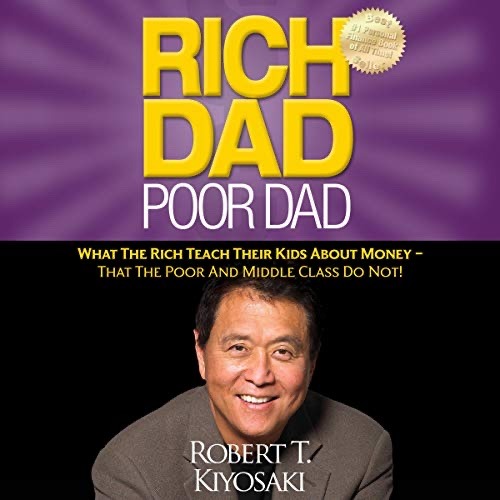
The book is based on the author's experiences and lessons learned from two different father figures in his life. One was his own father, who he refers to as his "poor dad," and the other was his best friend's father, who he refers to as his "rich dad."
The author uses anecdotes and stories from his own life to illustrate key financial concepts, such as the difference between assets and liabilities, the importance of cash flow, and the power of passive income.
The book is divided into ten chapters and covers a range of topics, including:
Rich Dad, Poor Dad
The Rich Don't Work for Money
Why Teach Financial Literacy?
Accounting and the Cash Flow Pattern
The History of Taxes and the Power of Corporations
The Rich Invent Money
Work to Learn—Don't Work for Money
Overcoming Obstacles
Getting Started
Still Want More? Here Are Some To Do's
This book has inspired many people to take control of their finances and start building wealth. It encourages readers to think differently about money and to focus on creating passive income streams rather than relying on a traditional job.
#rich dad poor dad#robert kiyosaki#moneytips#successmindset#successsecrets#finance#new books#non fiction#entreprenuership#entreprenuerlife#booksbooksbooks#books and reading#book review#books#best seller books#bookclub#bookshelf#bookstagram#books & libraries#booktok#book recommendations
160 notes
·
View notes
Text

I’m Glad My Mom Died by Jennette McCurdy
i have been meaning to read this since it was released last year and am embarrassed to be so late to the party! 😂
jennette mccurdy is one brave woman, and i found her raw words and unapologetic delivery nothing short of inspiring. i listened to this as an audiobook on spotify, and i’m so glad i did because getting to actually hear jennette mccurdy tell her story was even more powerful. this book made me laugh, tear up and boil with anger, and i look forward to what she brings to the writing world next.
started: 14/11/2023
finished: 15/11/2023
rating: ★ ★ ★ ★ ★
#i’m glad my mom died#jennette mccurdy#bookblr#book blog#five star review#non fiction book#book review#book recommendations#book worm#reader
14 notes
·
View notes